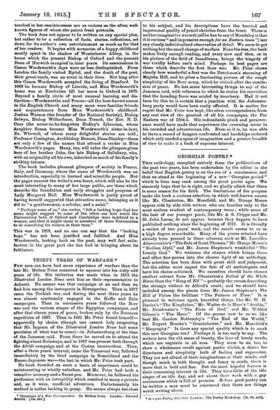GEORGIAN POETRY.*
Tars anthology, compiled entirely from the publications of the past two years, has been undertaken by the editor in the belief that English poetry is on the eve of a renaissance, and that we stand at the beginning of a new "Georgian period" which in time may rank among the great poetic ages. We sincerely hope that he is right, and we gladly admit that there is some reason for his faith. The limitations of his purpose make the book a curious selection, in which well-known names like Mr. Chesterton, Mr. Masefield, and Mr. Sturge Moore appear side by side with writers who are familiar only to the most zealous student of contemporary verse ; while some of the best of our younger poets, like Mr. A. S. Cripps and Mr. St. John Lucas, do not appear, because they happen to have published nothing since the beginning of 1911. It is literally a review of two years' work, and the result seems to us in a high degree remarkable. Many of the pieces selected have already been praised in these columns, such as Mr. Laseellcs Abercrombie's "The Sale of Saint Thomas," Mr. Sturge Moore's "Sicilian Idyll," and Mr. James Stephens's wonderful "The Lonely God." We welcome the chance which brings these and other fine poems into the clearer light of an anthology. The selection has been done with great skill and judgment, but the editor must expect the fate of all anthologists and have his choice criticised. We ourselves should have chosen another extract from Mr. Chesterton's Ballad of the White Horse than the "Song of Elf "—probably the verses describing the strange visitors to Alfred's court ; and we should have included among the pieces from Mr. James Stephens's 27te Hill of Vision the brilliant "The Fulness of Time." It is pleasant to welcome again beautiful things like Mr. W. H. Davies's "The Kingfisher," Mr. Walter de In Mare's " Arabia," Mr. Drinkwater's "The Fires of God," and Mr. Wilfrid Gibson's " The Hare." Of the poems new to us we like best Mr. Gordon Bottomley's "The End of the World," Mr. Rupert Brooke's " Grantchester," and Mr. Masefield's "Biography." Is there any special quality which is to mark this new Georgian era ? Perhaps it is too early to say. The writers have the old sense of beauty, the love of lovely words, which are requisite in all eras. They seem to us, too, to show a wholesome revolt against poetic clichés, a desire for directness and simplicity both of feeling and expression. They are not afraid of their imaginations or their minds, and though much in both thought and fancy is crude, there is more that is bold and fine. But the most hopeful feature is their consuming interest in life. They have little of the idle singer of an idle day, and set about their work with a gay seriousness which is full of promise. Before good poetry can be written a man must be convinced that there are things worth writing about.






































 Previous page
Previous page